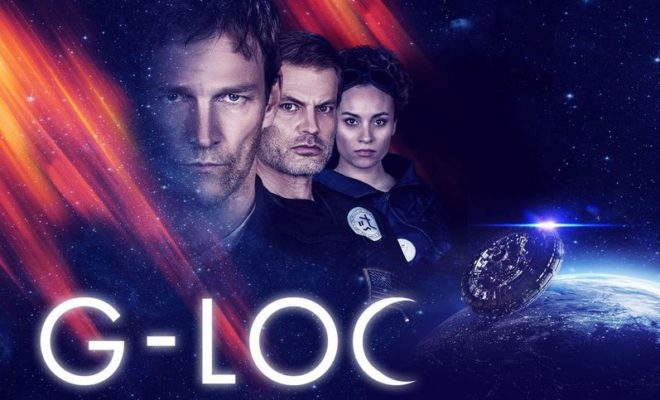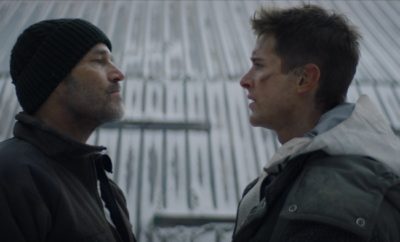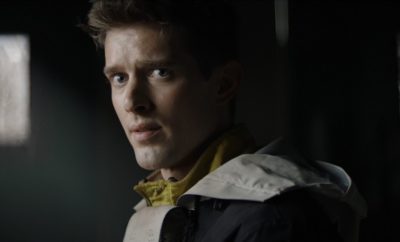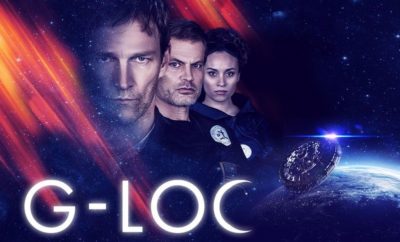
Interviews
Stephen Moyer and Casper Van Dien – G-LOC
By: Maggie Stankiewicz
Q) Please tell us a little bit about the premise for G-LOC and how your character comes into play.
Stephen Moyer: It’s about a kind of dystopian world in which there has been a destruction of earth and it’s not able to be lived on anymore. Some twenty-years before this event a portal had arrived over the earth, which was a gate to another earth-like universe. People start traveling and leaving to live there. As things get really bad, my character Bran and his wife start trying to save money for his daughter to be able to go.
Then, there is some travel where my character runs into his sort of better-looking doppelgänger [laughs], because apparently if you go to [the planet] Rhea, you get a lot of muscles and you age very well. And my character wants to do that. [laughs] It’s more about the idea that everything you’ve been indoctrinated with; the idea is that other people are not really the problem. It is usually yourself that needs to be the one who changes. Both of our characters have some different points of view and it’s about coming together and realizing what the true essence of humanity is.
Casper Van Dien: All of this and I just thought it was about the English trying to come over to America. And us Americans, who were once English saying, “No back off! We don’t want you here.” That’s all I thought this was.
Stephen Moyer: Yup, that’s all it is.
Casper Van Dien: And all the Rheans want is for them to speak American English.
Stephen Moyer: Well, you know they say that Americans actually sound like the old farm workers from Cornwall. I’m just a fact machine.
Q) How were your characters Bran and Decker originally described to you?
Casper Van Dien: They described Decker as a more handsome Stephen Moyer with a farmer’s accent. [laughs]
Stephen Moyer: That’s all you need to know.
Casper Van Dien: When I read the script, Tom Paton is just a new, young, genius. I love the way he thinks and I love the way he writes and I just think he captured so well what we’re all going through right now. It all feels so strange. But he’s just a really smart man. He sat us all down and he told us what he envisioned, how this came from a documentary that he’d seen about immigration and he talked to us about it. Stephen’s part had already been cast and so I couldn’t steal that from him even though I tried really hard.
Stephen Moyer: I don’t sound like a farmer, so it would have been an issue – obviously. But you’re perfect for your role.
Casper Van Dien: So, I had to be me. They needed me to be the father.
Stephen Moyer: When Tom and I first started talking, we talked about the fact that Bran has a seventeen-year old daughter, just like I did at the time, and what that means to him. I’ve got more than one kid, but Bran has one and we wanted to explore how much you would do for them and what you would do to make their lives better. So, we talked about constructing Bran in that way and thinking about how one’s own experiences pass through to both characters. That stuff is always very interesting, especially if you’ve got a handle on it from your own life. When I originally gave notes, that was a lot of what we talked about. I don’t know if you know this, but I’ve got a poppy [tattoo] on my arm here. I have a daughter named Poppy. In the original script it was actually supposed to be a sunflower, but Tom said why don’t we change that from a sunflower to a poppy? That way we wouldn’t have to cover it up every day. Saves hours on make-up. I think it’s really smart to just sit down and discuss what you can bring up to the plate and how that can be used to aid the story. Being a father was super helpful.
Casper Van Dien: I have children too, a lot of them as well. I also had a seventeen-year old daughter when we were doing this. We talked too about being father and what you would do to protect your child. This helped me have compassion for where my character was coming from. Not in how he was going about it, but understanding his position. Like Stephen was saying, we both came at it as fathers. Not as a hero or a villain but as somebody who would do anything for his children.
Stephen Moyer: I like that the bad guy has a truthful and understandable story because it is complicated for the audience to understand that these guys are really similar. There are other characters as well. There’s one character who Bran thinks represents everything he dislikes about Rhea and through their interactions he gains another perspective. So, by being with and learning other people’s perceptions to understand where they’re coming from – that fuses into your own world view.
Q) Were there any attributes or nuances you brought to your characters that weren’t necessarily in the script?
Casper Van Dien: We both had directed before and acted for a long time. With Tom, he’s a director that we really trust and believe in and that brought us a lot of freedom. This is a smaller budget and time was of the essence, so we had to rush but I have a lot of faith in Tom and Stephen. We hashed out a lot of stuff off camera, at night and over dinner. We did a lot of talking. That gave us the opportunity to really enhance what we were doing. In this case, it really felt like it gave us a lot to relate to and realizing how we were very similar to each other off camera, which helped with character development on camera.
Stephen Moyer: We’ve also both been at this a long time with big budgets and small budgets, so it helped us understand that there are times when you only have fourteen minutes to go and you know: A) that you’re not going to get another go at it because there’s more scenes to hit tomorrow, and B) there isn’t enough money for overtime. At those points, its one’s job to rev the engine. As much as it is the director and first AD and everyone, as the actor if you just drive it there’s an energy that you bring to the table that just pushes the thing along, which is what Casper and I did. There were some crazy days where we were shooting a lot of footage. That’s just experience and the love of it. We both love it. There’s a lot of fun to be had from enjoying the work and the industry of it.
Q) G-LOC brings together a lot of really topical issues and bundles them into this epic space adventure. Was it the social commentary on the nature of humanity, the treatment of refugees, and the notion of co-existence that drew you to the film?
Stephen Moyer: It was all of that. Like we mentioned, Tom is super smart. He had watched a documentary about families traveling up through South America and getting to the point of the Mexican border before being stopped at the refugee camps. His idea was to create one of these refugee camps in space that doesn’t allow people into their universe, and the effects of that. I thought it was a brilliant idea, especially if you have people who look just the way we do. There are no space aliens. It’s just humans and they’re not that much different – we’ve just been exposed differently. That makes it that much easier to understand from an audience perspective, so I really loved that. Tom’s super smart and I’ve seen what he’s done with a super low budget before and I’ve always been impressed.
Q) What would you say Decker and Bran’s biggest motivations are? Survival comes to mind, but are there other forces at play?
Casper Van Dien: It’s definitely family. We both have daughters. Both of our characters have a family. So, these are things that drive us. And survival, which is a core thing. But if you take what you’d do for your family and what you’d do for your children, what you would do to ensure their safety and your own personal survival, all of that was very interesting to me. Tom is so intelligent and he made it all sound so appealing and more fun because of his excitement and enthusiasm for material he wrote. Reading it made you feel invested in the choices these characters were making and I could see me doing this. I wanted to feel what it was like. It was all exciting for me. Stephen and I had a great time discussing this.
Stephen Moyer: Yeah, I think that what Casper said is true. Tom is understanding of narrative structure and what family means. Tom doesn’t have kids yet, but he’s very understanding of family and the idea of lineage. We talk about survival. The survival instinct is exceptionally strong. Like, when you have nothing left – people don’t just stop. They somehow carry on with very little because what else is there? It answers that question too. What else is there? And I was drawn to that idea. When you lose everything, what do you do? Do you give up or do you keeping going?





You must be logged in to post a comment Login